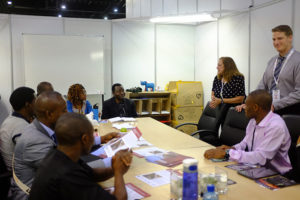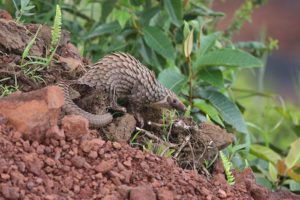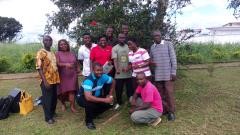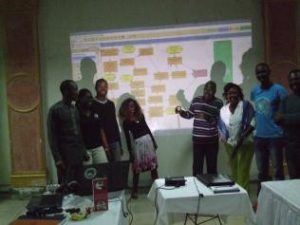Story from Anne Ntongho
The U.S. Fish & Wildlife Service’s MENTOR Fellowship programs play an important role in capacity development by providing high-level training and field experience to teams of young African professionals who are committed to becoming conservation leaders.
In 2016, the USFWS financed Open Standards workshops for three MENTOR programs. These workshops trained the MENTOR fellows to use the OS for adaptive management. Training will help the fellows develop research and funding proposals that follow the OS. These workshops also gave CCNet Africa coaches the opportunity to test and improve their coaching skills.
MENTOR-POP Program
MENTOR-POP (Progress on Pangolins) fellows are focused on addressing pangolin bushmeat trade and international pangolin trafficking. Pangolins are unique, scale-covered mammals that are heavily hunted in Africa and Asia for their meat and scales, which are used in traditional medicine.
In 2016, the nine MENTOR-POP fellows received two OS training workshops on adaptive management. The workshops have helped the MENTOR-POP fellows ensure that their work continues to have a positive impact on pangolins. The OS workshops were facilitated by CCNet Africa coach Andimile Martin, a past MENTOR-BEAN (Bushmeat-free Eastern Africa Network) fellow from Tanzania. Dr. Martin worked with the fellows to review and validate their projects. Lauriane Streit, a coach from CCNet Europe, provided hands-on support and reviewed the projects’ conceptual models and result chains. CCNet Africa coaches Zacharie Nzooh and Julia Biloghe (a past MENTOR–FOREST fellow from Gabon) also facilitated some of the workshop sessions, giving them a chance to sharpen their coaching skills.
In Fall 2016, MENTOR-POP fellows attended the 17th meeting of the Conference of the Parties to the Convention on International Trade in Endangered Species of Wild Fauna and Flora (CITES). At the conference, the fellows got all three Central African pangolins (as well as all the other pangolin species) uplisted to Appendix I in CITES, which provides the highest level of protection afforded by the treaty. These listing changes received almost unanimous support.
MENTOR-PACE Program
MENTOR-PACE (Protection of Apes and Conservation of Ecosystems) is an 18-month program that seeks to strengthen conservation leadership in Sierra Leone and Liberia in order to address threats to the western chimpanzee and the Upper Guinean forest ecosystem. In 2016, the eight MENTOR-PACE fellows attended an OS training on adaptive management. This training was strongly supported by CCNet Africa coaches. The fellows are using knowledge from the training to finalize their projects so that they can commence fieldwork on three projects: Chimpanzee Trade and Consumption Documentation, Communities Awareness and Commitment, and Chimpanzees Field Assessment.
MENTOR Manatee Program
The MENTOR Manatee fellows are collecting data to document the extent of manatee hunting for bushmeat and leading educational outreach activities for manatee conservation. The 2016 OS workshop in Cameroon was the second training attended by the eight MENTOR Manatee fellows from Cameroon, the Democratic Republic of Congo and Gabon. As a part of the two-year MENTOR program, each fellow receives a stipend for participation in three training workshops.




